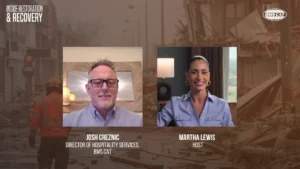Listen: Hospitality’s Cultural Shift Toward Sustainability with Jeanne Varney, a lecturer for Cornell University
There is a recent cultural shift towards going green and being more sustainable, with innovation occurring from the top-down. Jeanne Varney, a lecturer at Cornell University, explains how that as affected the hospitality industry, with processes directly in the hands of the consumer and guest.
“I think certainly with the advent of social media, global awareness, and the United Nation’s Sustainable Development Goals and all kinds of other activities in the arena of sustainability, we have a much more uniformed approach to how as an industry we are sending strategies and dealing with different issues related to sustainability,” Varney said.
Sustainability is very broad and has evolved to not only include the environment, but social equity, national prosperity, and corporate responsibility as well. With more emphasis on responsibility and personal accountability, there are specific issues hotels face with being sustainable.
“There are a few areas that really sort of drive the industry. There’s some big obvious ones like energy, waste, and the food and beverage perspective,” Varney said. “With energy, we have a lot of really great, smart, and innovative manufacturers that help us automate a lot of our controllables. From a food and beverage perspective, buying locally and trying to force your food ingredients closer to the consumers and that is something our food production industry is helping hotels with by making more available and helping us sort of understand how to get access to these resources that are more local.”
However, one of the biggest issues with hotels is that a lot of the fixing of energy, waste, and food consumption falls in the hands of the guests at the hotel. Finding a balance of keeping sources low on their end and also worrying about how the guests behave makes sustainability even more difficult.
“We sort of have to work behind the scenes to minimize that guest impact. Most of the time, guests will generally be responsible in their activities and not leave the lights on in the room when they leave. But if they do, we want to have those efficient bulbs on site, aerators in the sinks, and digital control over the thermostats.”
Although the balancing act among hotel staff and its guests is difficult, improvements and evolution is general society’s care for the environment has helped with the hospitality industry’s sustainable efforts.
“We are absolutely seeing a shift in customer demands as the general public has become far more educated related to their own personal footprints and impacts on the environment,” Varney said. “And the interesting thing as well about the evolution of the customer is you really can’t do just one activity anymore and call yourself a green hotel. So really sustainability now is not just about the environment, but it’s about a collected effort to run responsible businesses.”
For more information about Cornell log on to https://www.cornell.edu/.
For the latest news, videos, and podcasts in the Hospitality Industry, be sure to subscribe to our industry publication.
Follow us on social media for the latest updates in B2B!
Twitter – twitter.com/marketscale
Facebook – facebook.com/marketscale
LinkedIn – linkedin.com/company/marketscale









